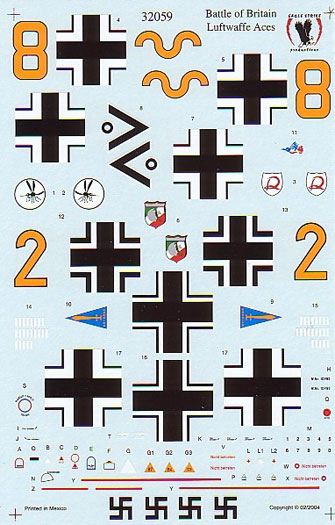|
S u m m a r y
|
| Catalogue
Number: |
Eagle Strike #32059
Battle of Britain Luftwaffe Aces Pt.I |
| Scale: |
1/32 |
| Contents and Media: |
Double-sided full colour
letter-sized instructions plus notes sheet; 2 x decal
sheets |
| Price: |
USD$12.00 available online from Eagle Strike Productions'
website |
| Review Type: |
FirstLook |
| Advantages: |
Well-printed, thin carrier
film, perfect registration, supplied stencil data, colourful
subjects. |
| Disadvantages: |
|
| Recommendation: |
Recommended |
Reviewed by Rob Baumgartner

Eagle Strike Productions' Gustavs Part 3 are available online
from Squadron.com
Here we have the start of what should be a very interesting series. The Bf
109E flew in some very colourful and unusual schemes during the Battle
of Britain. To have the Aces singled out for a series of sheets promises
much.
This first offering contains some well-known subjects but it has been a
while since they were available in this scale. Eagle Strike’s cover
sheet recommends the Hasegawa F-14A/ F-14D Tomcats…I’d like to see that!
The colours themselves are very well printed and on my example the
registration was perfect. The carrier film is very thin which is what we
have come to expect from this manufacturer.
The always-welcome stencil data is included and the printing of the
words is very crisp and legible. There are also VDM decals for the
propeller blades, which is a nice touch.
Bf 109E-1, “Yellow 8”, 9./JG2
 It
is believed that Lt. Rudolph Rothenfelder usually flew this aircraft (he
is also associated with “yellow 7” which had an all yellow engine cowl,
rudder and spinner). It
is believed that Lt. Rudolph Rothenfelder usually flew this aircraft (he
is also associated with “yellow 7” which had an all yellow engine cowl,
rudder and spinner).
Being an early example, one of the reference sources given in the
instructions quotes the upper surface colours as RLM 70/71. Looking at
the appropriate photo suggests it could just as easily be RLM 71/02.
In fact that same reference book illustrates it in RLM 71/02 despite
their RLM 70/71 caption! The demarcation of these colours is very high
with a mottle down the entire fuselage sides.
The aircraft appears to have had another identity in a past life as the
paintwork under the numeral “8” testifies. The Stechmücke badge of 9./JG
2 sits on the engine cowling and while the disk is sometimes yellow on
other machines, in this instance the photo clearly shows it as white.
The JG 2 shield is present under the cockpit and was painted on both
sides of the machine. The early use of the wavy line to denote the III.
Gruppe is shown behind the Balkenkreuz and the spinner is RLM 70 with a
yellow tip.
Bf 109E-3, “Black <o”, III./JG51
Oblt. Werner Pichon-Kalau von Hofe had this machine when he was Technical
Officer of III./JG51.
Interestingly one of the reference books used for this subject again
confuses itself with the colour scheme. They illustrate and caption the
aircraft with RLM 70/71 upper surfaces and yet show and describe a photo
of this machine on the same page as RLM 71/02. In this instance Eagle
Strike followed the illustration but a good case can be made for the
latter scheme.
The aircraft wears the III. Gruppe “Axe of Niederrhein” under the
fuselage but no III Gruppe bar. The fuselage is void of any mottle and
the spinner is in the regulation RLM 70.
Bf 109E-4, “Yellow 2”, 3./JG2
No Emil aces series would be complete without the aircraft of Oblt. Helmut
Wick.
Many aircraft of JG2 wore this stippled camouflage over the original RLM
71/02/65 scheme.
The scoreboard on the rudder shows 22 victories which dates the aircraft
as no earlier than the 25 August 1940.
On the engine cowl we see the emblem of 3./JG 2. The colours of blue and
yellow were a reference to the Swedish relationship of former
Staffelkapitäin Hennig Strümpell.
Behind this is the JG2 “Richthofen” badge and fortunately Eagle Strike
have not forgotten Wick’s personal Kingfisher emblem that was seen under
the rear canopy on the port side.
Note that the fuselage Balkenkreuz has had the white borders reduced in
size to lessen its visibility.
Wick scored 56 victories in total before being posted MIA after bailing
out of his stricken aircraft over the sea on 28 November 1940.
With three different types of the Bf 109E covered on this sheet, there
should be something to keep most Battle of Britain modelers happy. If
not, there are more sheets to come in this series so stay tuned.
Recommended
Thanks to Eagle Strike Productions
for the review sample.
Review Text Copyright © 2004 by
Robert Baumgartner
Page Created 02 July, 2004
Last updated
01 July, 2004
Back to
HyperScale Main Page |
Home | What's
New | Features
| Gallery |
Reviews | Reference
| Forum
| Search